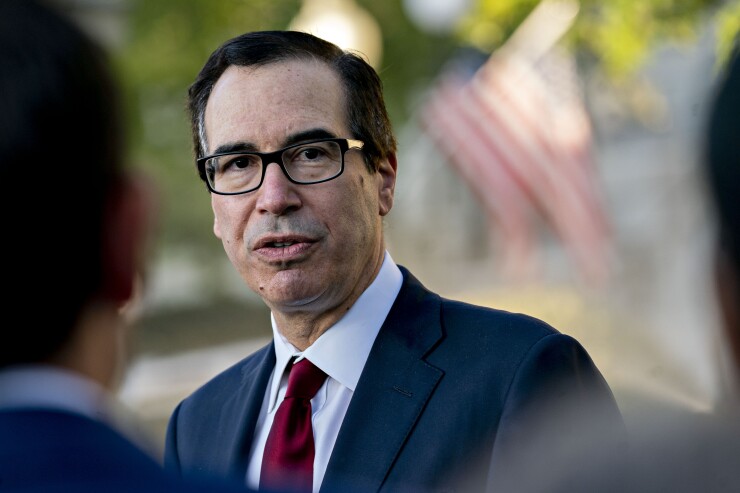WASHINGTON — Treasury Secretary Steven Mnuchin repeated his concerns Tuesday about Facebook's plan to develop a cryptocurrency, one day before the social media giant's CEO is expected to face tough questioning from House lawmakers.
"We’ve told [Facebook] that we thought that their launch was premature, that they had not addressed fundamental issues around money laundering," Bank Secrecy Act requirements and other issues, Mnuchin told members of the House Financial Services Committee.
Mnuchin's comments, which echoed remarks

Criticism of Facebook's plan will likely be front and center on Wednesday when CEO Mark Zuckerberg is scheduled to testify before the committee. Libra has already elicited strong reservations from lawmakers and regulators. The social media giant has seen payments giants such as PayPal, Visa and Mastercard
At Tuesday's hearing, Mnuchin discussed the creation of a subcommittee of the Financial Stability Oversight Council to look into cryptocurrency-related risks, as well as talks with central bank governors and finance ministers of other countries.
“This is a discussion that is going on at the G-20, the G-7 and … the FSB as well,” he said, referring to the Financial Stability Board.
Rep. Emanuel Cleaver, D-Mo., asked Mnuchin whether the FSOC working group will "assess systemic risk and apply whatever appropriate regulations are needed.”
“Yes, that will be one of the issues amongst many that we will look at,” Mnuchin responded.
Yet Libra is only one area of Facebook's expanding reach that has alarmed lawmakers. On Tuesday, it came to light that attorneys general from 47 states have joined an antitrust probe into the social media giant, led by the state of New York.
Meanwhile, Ralph Hamers, the chief executive of ING, told the Financial Times on Tuesday
Additionally, three senators — Mark Warner, D-Va., Josh Hawley, R-Mo., and Richard Blumenthal, D-Conn. — announced legislation Tuesday requiring companies to allow consumer data to be portable in an aim to boost competition among social media platforms.
“The exclusive dominance of Facebook and Google have crowded out the meaningful competition that is needed to protect online privacy and promote technological innovation," Blumenthal said in a joint press release.





